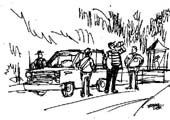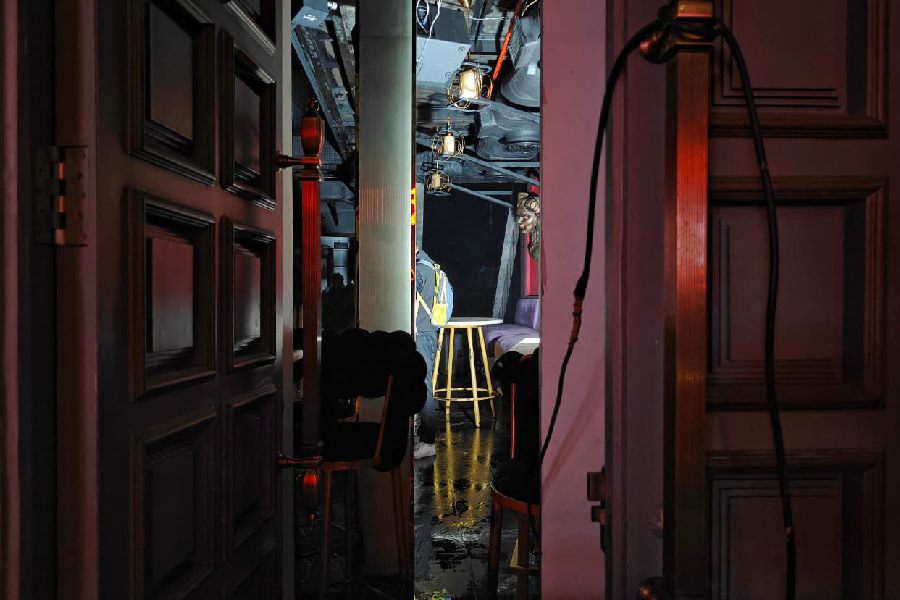 |
Planting tea was a different ball game in the Fifties, you know,” Sagar Mehta said in a ruminative manner. “I have seen tea planters working for 48 hours at a stretch virtually without sleep and I have also seen the same planters going on a spree non-stop for three days in the planters’ club. I can talk endlessly about those good old days, but I am afraid you will get tired.”
“Not in the least,” I hastily assured him. “I never get tired of hearing about those old-timers who created the romance of tea and whose numbers are dwindling with every passing year. Many of them were even born and brought up here and hardly knew their homeland. I often wonder how they adjusted themselves when they eventually returned ‘home’ after long years of service in the tea gardens of Assam.”
“Well, when I joined tea in 1954 at Gandrapara tea garden in the Dooars, T.A. Walker, who was popularly known as Rampur hound, was my manager. After a few months of my joining, Walker went on long furlough and Duncan Allen took over as ‘locum’. Allen was with the company for many years and finally left when the company changed hands. Since you mentioned the plight of tea planters when they return to Britain, let me show you something.”
Mehta walked into the bedroom of his capacious bungalow at Koomtai tea estate and returned with a piece of paper, which he carefully unfolded. It was a letter from Duncan Allen addressed to Mehta. As I went through the letter, I discovered a new world.
Allen was born at Kanjikoa near Panitola in Upper Assam, which is now an out division of the Kharjan tea estate. Those days it was part of the Budla Beta Tea Company near Doomdooma. Allen’s father, two uncles, a great uncle, father-in-law and two brothers-in-law were all tea planters in Assam, the Dooars and Ceylon (Sri Lanka). He did his schooling in England and returned to India as a soldier straight from school. Here he joined the Indian Military Academy in Dehra Dun where he was a cadet at the same time as General Zia, who later became the President of Pakistan. Allan was commissioned in the 1st Gurkha Rifles and served in the North West Frontier where he was an eye-witness to the horrific killings that took place in Punjab following Independence and the creation of Pakistan. After Independence, he left the army and joined Duncans in April, 1948.
At that time the company had not been doing particularly well with mostly old tea bushes giving low yield. There were lots of “vacancies” in the middle of tea areas as well as dilapidated factory buildings and general mismanagement. But then a new tea department came up in Calcutta and with competent visiting agents and excellent engineers and a dedicated team of managers there was a complete turnaround and it became one of the best companies in India. But for the expatriate planters there came a major setback in 1972 when the rupee was devalued and tea companies could not afford to pay the British planters a salary which was anything worth in terms of sterling. Most British planters left and so did Duncan Allen.
However, when he returned to the UK after so many years in Assam, he found himself a complete stranger there. He was completely bewildered by the cold grey country that was his home. He did not have enough money to buy a house or to invest, nor did he have the skills expected by prospective employers. So he became a small-time hotelier, gradually buying bigger and better businesses till at last he retired as a reasonably well-off person. Then turning to local politics, he became a councillor, a post with which came many important positions and responsibilities. As his three children had grown up and left home along with his four grandchildren, Allen and his wife were left alone in their four-bedroom house with a garden. Duncans gave him a pension of £250 a year, which was a week’s pay of a truck driver in Scotland. Notwithstanding all this, his mind would often drift away to the tea gardens in Assam, which was the land of his birth.
“Did you, by any chance, know Big Mac, as he was commonly known in the Dooars? I remembered him since November 19 was the 40th anniversary of the Chinese aggression of 1962 and something about him in the backdrop of those fateful days had appeared in this column some time ago.”
“Oh, that was Donald Mackenzie. Yes, I knew him very well. We became close to each other when we were neighbours in 1962-63 — he was the manager Bagrakote Tea Garden and I was looking after Putherjhora in the Dooars. It was quite common those days to borrow things from neighbouring gardens. Once there was a terrible breakdown in my factory and I desperately needed some spare parts immediately. Late in the afternoon, I called on Allen to request him to lend the required machinery parts for my factory. He not only complied with my request, but also reached the articles to my garden with his vehicle and invited me also to join him for a drink. I accepted his invitation and came to his place in the evening. Both Donald and his wife received me cordially and following an exchange of pleasantries, offered me a drink which was more of Scotch and less of water. His wife looked quite worried since Donald’s hospitality used to carry on till midnight. However, I was quite used to such generosities in tea!”
Mehta told me that Mackenzie used to be called “Big Mac” because he was about 6 feet 3 inches tall and broad in the same proportion weighing 115 kg. He was a very large-hearted man and a great hunter. He was married to a Christian Dior model, who was equally gentle and hospitable.
Mackenzie also was quite witty. Once he was returning from Dharan in Nepal where he had gone on the invitation of the British Gurkha Recruiting and Welfare Centre, since he himself was once an officer with the Gurkha Rifles. After enjoying post-golf hospitality of the Gurkha officers, he was naturally in high spirits. His hosts had also presented Allen with two bottles of Scotch, which he was carrying with him.
At the Indo-Nepal border the Excise officials stopped him for a routine check and they found the two bottles of Scotch. The concerned Excise officer pointed out to Mackenzie that the Excise regulations did not permit carrying of scotch across the border.
He simply smiled and told them that they need not worry. He would not carry the bottles. Saying this, he opened one of the bottles and started drinking on the Nepal side of the border. Even as he downed half the bottle, the officer came to him and told him that he could carry the bottles across the border.
Mackenzie thanked him and drove across the border quite well-disposed. But he gave a clear indication by obliging the officer that he had full respect for the law of the land, which he would not violate at any cost.











